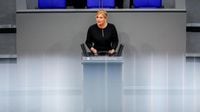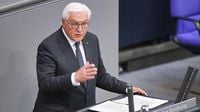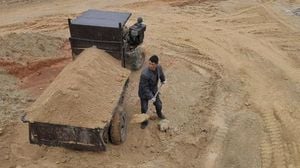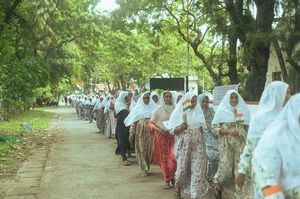On May 8, 2025, the Bundestag commemorated the 80th anniversary of the end of the Second World War, a significant moment in history that marked the liberation from National Socialism. Bundestagspräsidentin Julia Klöckner delivered a poignant speech emphasizing the often-overlooked suffering of women during the war. She remarked, "Of course, women were not free of guilt during the Second World War. But especially women and girls had to endure much suffering, including sexual violence, during and after the war. They are the frequently overlooked victims of every war." Klöckner characterized the Second World War as the most brutal conflict in human history, stating, "Everywhere in Europe, German occupiers committed war crimes. In Eastern and Central Europe, they waged a racist war of annihilation aimed at the extermination of entire peoples."
In her address, Klöckner also expressed concern over the collective amnesia surrounding the Holocaust, lamenting, "The enormous scale of German crimes is still not fully understood by everyone. Or worse still, many do not want to deal with it anymore. To counter this tendency is also the purpose of the commemoration on May 8." She sharply criticized the planned celebrations in Moscow for May 9, stating, "What a misuse of history! Bucha, Irpin, Mariupol: once again, girls and women are becoming victims of sexualized violence, used as weapons of war."
Klöckner's remarks came against the backdrop of the ongoing Russian invasion of Ukraine, highlighting the need for military readiness to preserve peace and freedom. "For a long time, we felt that peace was untouchable. Now we must rethink. To preserve peace and freedom, we must be capable of defending ourselves militarily. On the 80th anniversary of the end of the war, it is about remembering - and at the same time fulfilling our duty: those who were liberated must defend freedom," she asserted.
The commemoration was attended by various dignitaries, including Frank-Walter Steinmeier, the Federal President of Germany, who reiterated the importance of remembering the lessons learned from the Nazi dictatorship. He stated, "We know where isolation leads, where aggressive nationalism and contempt for democratic institutions lead. We have lost democracy in Germany once before." Steinmeier emphasized that May 8 has become a core part of German identity as a day of liberation, asking, "We no longer need to question whether May 8 liberated us. But we ask: How can we remain free?"
During the event, Steinmeier underscored the necessity of adhering to the international order established in the aftermath of the war, which is now being challenged, particularly by the United States. He warned of the growing influence of extremist forces within Germany, stating, "These forces mock the institutions of democracy and their representatives, poison debates, exploit people's fears, and incite people against one another."
Steinmeier's comments drew a response from Tino Chrupalla, the leader of the AfD, who dismissed any suggestion that his party represents extremist views. He criticized Steinmeier's speech as inappropriate, arguing that it misused the significance of the day.
In a powerful moment, Steinmeier recounted a personal experience from a recent visit to Warsaw, where a survivor of the Warsaw Uprising took his hand and said, "Poland and Germany are friends today. Never would I have imagined that." He reflected on the importance of reconciliation, stating, "There is so much we can achieve with reconciliation and what we have achieved. Let us continue to work for it!"
The event commenced with an ecumenical service at the Kaiser Wilhelm Memorial Church in Berlin, attended by key political figures, including the new Chancellor Friedrich Merz, who later laid wreaths at the Neue Wache, the central memorial for victims of war and tyranny in Germany. This solemn occasion was not merely a remembrance of the past but a call to action for the present and future.
As the commemoration unfolded, it was clear that the shadow of the past looms large over contemporary politics. The Second World War, ignited by Nazi Germany, resulted in the deaths of an estimated 50 to over 60 million people globally, with the majority being civilians. The Holocaust alone claimed around six million Jewish lives, a tragedy that continues to resonate deeply in Germany and beyond.
Steinmeier also acknowledged the sacrifices made by the Red Army in the liberation of Auschwitz, stating, "We know the contribution the Red Army made, with Russians, Ukrainians, Belarusians, and all those who fought in it. At least 13 million of these soldiers and just as many civilians lost their lives. We do not forget all that." He condemned the Kremlin's historical distortions, asserting, "The war against Ukraine is not a continuation of the fight against fascism. This historical lie is nothing more than a veneer for imperial madness, severe injustice, and heinous crimes."
The day of remembrance was marked by a stark absence, as representatives from Russia, Belarus, and several other nations were not invited due to the ongoing conflict in Ukraine. This decision underscored the current geopolitical tensions and the implications of historical narratives being manipulated for contemporary purposes.
As the world prepares for the largest military parade in Moscow on May 9, the events in Berlin serve as a reminder of the lessons history imparts. The importance of remembrance, accountability, and the commitment to defend democratic values remains critical in the face of rising authoritarianism and extremism.
In summary, the commemoration of May 8, 2025, was not only a tribute to those who suffered and died during the Second World War but also a clarion call for vigilance against the forces that threaten democracy today. The echoes of the past ring loudly, urging current and future generations to remember, learn, and act in defense of freedom.





